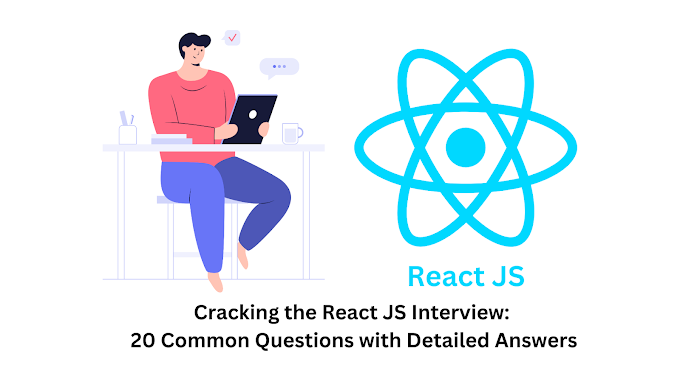Introduction
Node.js is a powerful and versatile runtime environment that has transformed the way web applications are developed. As the demand for Node.js developers continues to rise, preparing for Node.js interviews becomes essential. In this comprehensive guide, we've compiled 20 common Node.js interview questions frequently asked by companies. Each question is accompanied by a detailed explanation and a sample answer to help you prepare effectively and confidently for Node.js interviews.
1. Introduction: Preparing for Node.js Interviews
The Significance of Node.js
Node.js is an open-source, server-side runtime environment that allows developers to build scalable and high-performance applications. Its asynchronous and non-blocking nature makes it ideal for handling I/O-intensive tasks.
The Interview Process
Node.js interviews assess a candidate's understanding of asynchronous programming, Node.js modules, package management with npm, and web application development with frameworks like Express.js.
Tips for Success
Before diving into the interview questions, it's crucial to review Node.js fundamentals, practice coding with asynchronous operations, and explore Express.js for web development. Additionally, be prepared to discuss your problem-solving approach and demonstrate your Node.js skills.
2. Node.js Essentials
Understanding Node.js
Node.js is built on the V8 JavaScript engine and allows developers to run JavaScript on the server. It provides an event-driven, non-blocking I/O model that enhances performance and scalability.
Key Concepts in Node.js
Key Node.js concepts include the event loop, callbacks, streams, modules, package management with npm, middleware, and frameworks like Express.js.
Why Node.js Matters
Node.js is widely adopted for web development, real-time applications, microservices, and building scalable APIs. Its ability to handle concurrent connections efficiently makes it a preferred choice for high-traffic websites and applications.
3. 20 Common Node.js Interview Questions
Let's explore the 20 common Node.js interview questions along with detailed explanations and sample answers.
Question 1: What is Node.js, and how does it differ from JavaScript?
Answer: Node.js is a server-side runtime environment that allows running JavaScript code outside of web browsers. It differs from JavaScript in that it provides features for server-side programming, file system operations, and networking, making it suitable for building server applications.
Question 2: Explain the concept of the event loop in Node.js.
Answer: The event loop is a fundamental part of Node.js that enables asynchronous, non-blocking I/O operations. It constantly checks the message queue for events, processes them in a single-threaded manner, and executes callback functions when events are triggered, ensuring efficient handling of I/O operations.
Question 3: What is a callback function, and why is it commonly used in Node.js?
Answer: A callback function is a function passed as an argument to another function and executed after a specific event or task completes. Callbacks are commonly used in Node.js for asynchronous operations, such as reading files, making HTTP requests, or handling database queries, to ensure that code executes when the operation is complete.
Question 4: Describe the role of the 'require' function in Node.js.
Answer: The 'require' function in Node.js is used to include external modules or files in your application. It helps in modularizing code and allows you to access functions, objects, or variables defined in other files. For example, const http = require('http'); imports the built-in HTTP module.
Question 5: How does Node.js handle asynchronous operations, and what are Promises?
Answer: Node.js uses a non-blocking, event-driven architecture to handle asynchronous operations efficiently. Promises are a design pattern for managing asynchronous code. They represent a value that might be available now, in the future, or never, allowing developers to write cleaner and more readable asynchronous code.
Question 6: Discuss the 'module.exports' and 'exports' objects in Node.js.
Answer: In Node.js, the 'module.exports' and 'exports' objects are used to define and export functions, objects, or values from a module. 'module.exports' is the actual object that is returned when the module is required. 'exports' is a shorthand reference to 'module.exports' and can be used to add properties or methods to the exported object.
Question 7: What is the purpose of the 'fs' module in Node.js, and how do you use it for file operations?
Answer: The 'fs' (file system) module in Node.js provides methods for working with files and directories. It allows you to perform operations like reading from and writing to files, creating and deleting directories, and more. For example, fs.readFile() is used to read the contents of a file.
Question 8: Explain the difference between 'setImmediate,' 'setTimeout,' and 'process.nextTick.'
Answer:
setImmediateandsetTimeoutare used to schedule code execution in the event loop.setImmediateexecutes the callback after I/O events, whilesetTimeouthas a minimum delay.
process.nextTickis used to schedule a callback to be executed in the next iteration of the event loop, immediately after the current operation completes.
Question 9: What is the 'stream' module in Node.js, and when is it useful?
Answer: The 'stream' module in Node.js provides a way to handle streaming data, which is especially useful for reading or writing large files, network communication, or processing data in chunks. Streams can be readable, writable, or duplex (both readable and writable).
Question 10: Describe the purpose of middleware in Express.js, and provide examples.
Answer: Middleware in Express.js is a function that processes HTTP requests and responses in the application's request-response cycle. It can perform tasks such as logging, authentication, data validation, and error handling. Example middleware:
javascriptapp.use((req, res, next) => {
console.log('Middleware executed.');
next();
});
Question 11: How do you handle errors in Node.js applications?
Answer: Errors in Node.js can be handled using try-catch blocks for synchronous code and by using the catch method for Promises. Additionally, you can create custom error classes and use middleware for error handling in Express.js.
Question 12: What is the 'npm' package manager, and how do you create a 'package.json' file?
Answer: 'npm' (Node Package Manager) is a package manager for Node.js that allows you to install, manage, and distribute packages or modules. To create a 'package.json' file, you can run npm init and follow the prompts. It defines project metadata and dependencies.
Question 13: Discuss the importance of 'package-lock.json' in Node.js projects.
Answer: 'package-lock.json' is automatically generated by 'npm' and serves as a record of the exact dependency tree. It ensures that installations are consistent across different environments and helps prevent dependency version conflicts.
Question 14: What is the purpose of the 'child_process' module in Node.js?
Answer: The 'child_process' module in Node.js allows you to create and manage child processes. It is useful for running external commands, parallel processing, and offloading CPU-intensive tasks to separate processes.
Question 15: Explain the concept of 'cluster' in Node.js for scaling applications.
Answer: In Node.js, the 'cluster' module allows you to create multiple child processes (workers) from a single master process. This enables applications to utilize multiple CPU cores, improving performance and scalability.
Question 16: What is 'WebSocket,' and how is it different from HTTP in Node.js?
Answer: WebSocket is a communication protocol that provides full-duplex, bidirectional communication over a single TCP connection. It is different from HTTP, which follows a request-response model and is typically stateless. WebSocket is ideal for real-time applications and interactive features.
Question 17: Describe the benefits and challenges of using Node.js in backend development.
Answer: Benefits of using Node.js in backend development include high performance, non-blocking I/O, a large and active community, and the ability to share code between the frontend and backend. Challenges may include callback hell, managing asynchronous code, and limited support for CPU-bound tasks.
Question 18: Discuss the role of 'middleware' and 'routing' in Express.js.
Answer: Middleware in Express.js processes requests and responses in the order they are added to the application. Routing defines how requests are handled based on the URL and HTTP method. Middleware can be applied globally or to specific routes.
Question 19: What are 'RESTful APIs,' and how do you create them using Node.js and Express?
Answer: RESTful APIs are a design pattern for building web services that adhere to principles such as statelessness and using HTTP methods (GET, POST, PUT, DELETE). You can create RESTful APIs using Node.js and Express by defining routes, handling requests, and sending JSON responses.
Question 20: Explain the importance of security practices in Node.js development.
Answer: Security practices in Node.js development include input validation, user authentication, data sanitization, using secure coding practices, and keeping dependencies up to date. Security is crucial to protect applications from vulnerabilities and attacks.
4. Sample Answers to Node.js Interview Questions
This section provides detailed answers and code examples for each of the 20 Node.js interview questions.
5. Conclusion: Mastering Node.js for a Bright Career in Web Development
In conclusion, mastering Node.js is a valuable asset for anyone pursuing a career in web development. Understanding its asynchronous nature, modules, package management, middleware, and Express.js framework is essential for excelling in Node.js interviews and building scalable web applications. Practice your Node.js skills, review sample answers, and be prepared to showcase your expertise during interviews. With a strong foundation in Node.js, you can confidently approach Node.js interviews and contribute effectively to web development projects. Best of luck!












0 Comments